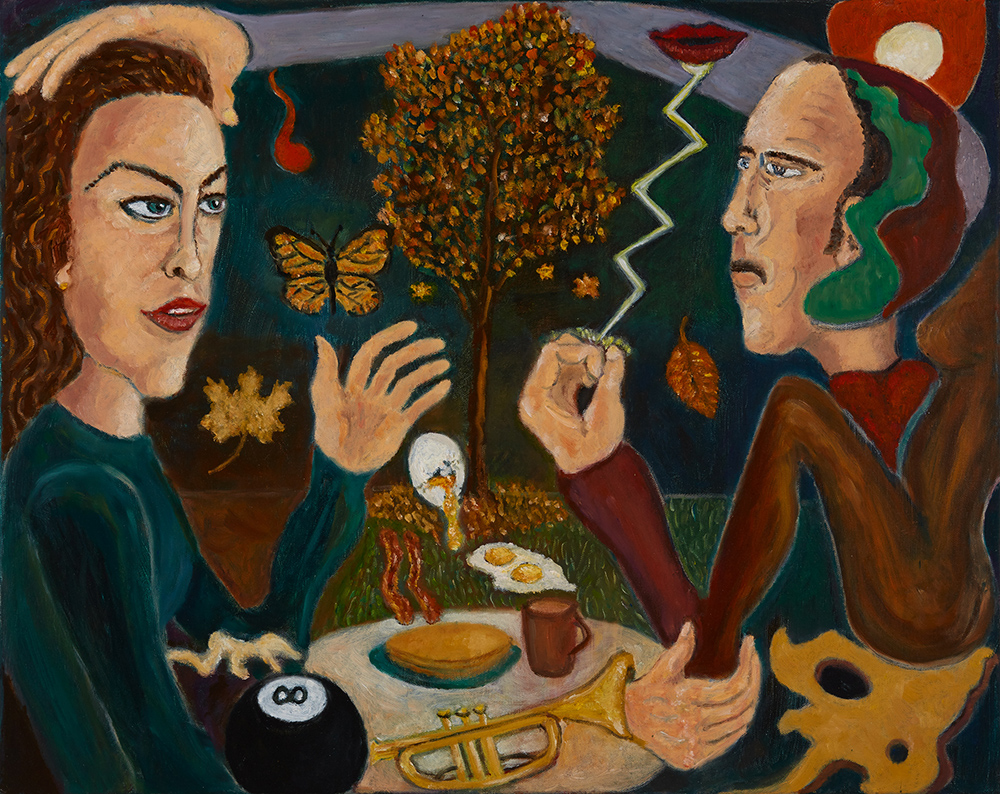By Teresa Milbrodt
My husband doesn’t see the three other incarnations of himself clustered around the dining room table, because he doesn’t realize the people he’s become and shed like snake skins. Though it looks like only two chairs are taken, others are filled.
“My parents need a home health care aide,” I say after serving us each a piece of lasagna, the best meal to have when I want to engage in A Serious Talk.
“They should move to assisted living,” says the fourth incarnation of my husband, taking a slice of garlic bread. This is the husband who wears a suit and tie, has graying hair, and nods to suggest he knows what he’s talking about. He thinks he’s being practical, but these are not his parents, so he believes he can get them out of their house and into an apartment using appeals to logic and a shoehorn.
I cut my lasagna with the side of my fork. It was a recipe I made for my husband when we were dating.
Your parents should stay at home for as long as they can, says the first incarnation of my husband, who wears jeans and a Pac-Man t-shirt he’d owned since high school. He lived in the time before he was my husband, beginning when he was twenty-five. That phase was all sweetness, flowers, and kisses for a year and a half, when I believed in makeup and high heels and didn’t know the real honeymoon is before marriage, when your brain chemicals are crazy in love and you don’t see chips in the paint.
“Won’t their insurance cover assisted living?” says the fourth incarnation of my husband.
“They don’t want an apartment,” I say as the first incarnation of my husband tears the crust off his garlic bread and stares at it contemplatively. He did more thinking than talking in our second year and a half of dating, a phase marked by “please” and “thank you,” sharing an apartment and adjusting to each others’ rhythms, like how I usually wore a t-shirt and cotton shorts to bed, not a negligee. It was an experiment to see if my Froot Loops and his Raisin Bran could coexist in the cupboard.
“My parents love their assisted living facility,” says the fourth incarnation of my husband. In this life he has forgotten the war with his mother over what to keep and what to auction. Much of his parents’ lives are in a storage shed we’ll excavate after they’re gone. You can’t sell your parents’ history while they’re around to cling to the antique four-poster bed, even if it lives in a dank garage four miles across town.
We could refinish the basement and let them move in with us, says the first incarnation of my husband, who was still alive during the early years of marriage when we were twenty-eight and thrilled with adulthood, car loans, and mortgages, scary and exciting financial commitments we could make with our real jobs and real paychecks and real credit card limits.
What will Medicare pay for? says the second incarnation of my husband, who wears button-down shirts and jackets that are too large, since he only bought clothing on sale, hyper aware that we had too many monthly payments, and why had we purchased such a big home if we didn’t want kids?
“An aide would be cheaper than nursing home care,” I say to my husbands, because aides tend to be kind and underpaid women, and my mother will be stringent with the interview process. Being allowed to clean her house is slightly more daunting than getting into Harvard, even if she can’t scrub toilets as hard as she used to and worries about slipping in the shower.
The second incarnation of my husband, who was laid off from his job at the advertising firm when he turned thirty-five, raises an eyebrow. I dreaded coming home when his life was long hours at coffee shops wearing too-big suits and filling out job applications, a man who didn’t feel like hugging me. I stayed at school, coached the quiz bowl and debate teams, and went to the yarn shop for Wednesday night happy hour so I could knit and marinate my problems in wine.
The fourth incarnation of my husband eats the top noodle off his lasagna. “Do these women have references?” he says.
“They’re all screened by the agency,” I say, at least according to my mother, and she’ll screen them again. She may be slowed down by her walker, but she speaks her mind.
Your mother is hell on wheels, says the third incarnation of my husband, who appeared in his late thirties and bought a new wardrobe of gray suit jackets and black pants to christen his new sales job. He had a grim determination and a grimmer sense of humor, called the job a Band-Aid while he looked for something else. That incarnation reminded himself how he was lucky to be employed.
Do whatever you think is best, the third incarnation says, since he lived at the office and tried to make up for what he considered lost time. He was focused on retirement funds, stock portfolios, and co-worker babble about 401Ks. I was surprised when he managed to work the dinner table into his schedule but he died two years ago, felled by chest pains that turned out to be something close to but not quite a heart attack.
“Good garlic bread,” says the fourth incarnation of my husband, who is fifty years old and has been watching his cholesterol and stress levels. “I guess you should talk more with your mother about this whole thing.”
I smile and nod because I was going to do that tomorrow, and maybe even visit the mother I have now, and her six other selves that are cleaning the living room, listening in on our conversations, and adding all the input that she’ll never hear.

Teresa Milbrodt has published three short story collections: Instances of Head-Switching, Bearded Women: Stories, and Work Opportunities. She has also published a novel, The Patron Saint of Unattractive People, and a flash fiction collection, Larissa Takes Flight: Stories. Her most recent publication is the monograph Sexy Like Us: Disability, Humor, and Sexuality. Milbrodt is an assistant professor at Roanoke College in Salem, Virginia. Read more of her work at: http://teresamilbrodt.com/homepage/

